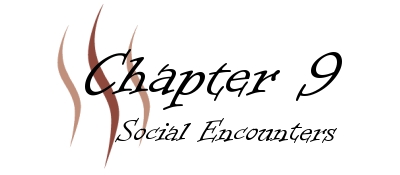Journey Social Combat
The game system encourages a specific type of play. In a system lacking complex social encounter rules, social encounters will likely be less nuanced. In a game that lacks detailed physical combat mechanics, physical combat will be seen as less important, overall.
In Journey's case, the goal is to encourage immersion. Journey is simulationist at its core, and to not encourage any type of play due to lack of mechanics would be an affront to this goal. To achieve this end, social encounter mechanics are needed.
This part of Journey will not be easy to write. There is not a system out there with a completely mechanistic method of dealing with social encounters, given the sheer number of possibilities. While swordslinging is reduced to a single die roll (or type of roll), you cannot do this with social encounters - there is too much risk of completely removing the need for roleplaying in these encounters.
An encounter with the bandit king should be tense, whether you are fighting with words or with swords. But given the fact that Journey combat is dangerous (as it should be), it would make sense to try to bargain first - and this should have the possibility of being more than just a meaningless gesture, as it would in the real world (that is, it would have a chance of working in the real world).
Because this system will probably be confusing and/or complicated, at least at first, I'll be referring to this example often: a party of adventurers is trying to barter with a bandit king, surrounded by bandits. No one is actively hostile, but everyone has half an eye on their weapons. The party wants to convince the bandit king to stop attacking a specific trade route. The bandit king rather enjoys pillaging. Text that relies on this example will be italicized.
Concept
On your turn, you get a full action. Most social measures require a full action, though some do not; you can use as many social measures in a turn as you have actions.
Social encounter turns are not 6 seconds. While a round may seem fast, each action taken represents anywhere from a witty remark that takes all of three seconds to utter, or a lengthy discourse that could take minutes. Taking an average, each round of a social encounter is 1 minute of world time.
Social encounters do not interact well with melee encounters: when a melee breaks out, that is usually an indication that the time for talking is done, and the time for fighting has begun.
The goal of the system is to make it possible for quiet or shy players to play charismatic, talking-type characters. Therefore, actual roleplaying isn't necessary. However, roleplaying is rewarded, because otherwise it wouldn't be done. Using The Big Lie (a social measure, explained later), if you actually roleplay what the lie is and how it's delivered, this will usually improve your chances of success.
Any social encounter system is going to be very "open design"-esque, because it has to be in order to foster roleplaying. So some aspects of this system are going to be rather subjective.
Descriptors
In 4e, various spells and martial maneuvers have descriptors, much as in 3.5. Social abilities (called "social measures") also have descriptors, which play into how they interact.
The descriptors are...
- Bluff: You bullshit the target.
- Charm: You try to get the target to like you.
- Impress: You try to amaze the target.
- Scare: You try to freak the target out.
- Persuade: You try to convince the target.
Similar to other Journey combat resolution mechanics (physical and spells), social combat has three kinds of offense and defense. These are...
- Wit: A quick wit and sharp tongue can sometimes be used in place of actual arguments. (Charisma-based)
- Logic: Facts, cohesive arguments, and solid reasoning. (Intelligence-based)
- Insight: You form an argument based on emotion, a hunch, or just a general feeling. (Wisdom-based)
For each measure, you roll a wit, logic, or insight roll, which is opposed by one of those three for the target. Your roll is influenced by whatever measure your opponent last used.
An Idea
The RPS theory can apply here, as well.
- Logic beats Wit: Attempting to cajole or belittle an argument presented with solid facts doesn't work so well.
- Wit beats Insight: Emotional arguments with no grounding in facts are easily mocked.
- Insight beats Logic: Touching the heart may work better than touching the mind.
Ego Points (EP) and Disgrace Points (DP)
Ego Points (EP) are similar to hit points. They are an abstract representation of your stake in the social encounter. If you lose all your ego points, your arguments are ignored or pushed aside in favor of someone else's. In a two-sided argument, if all the combatants on one side lose all their EP, the social encounter is over.
Disgrace Points (DPs) are similar to Trauma Points, in that you suffer them whenever an opponent crits you. The more disgrace points you have, the weaker your arguments, and there are often other more far-reaching social implications of having too many disgrace points.
